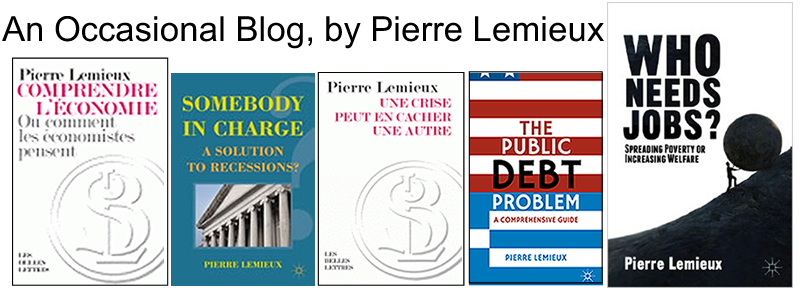Welfare economics, which was developed from the 1930s on (by Hicks, Kaldor, Samuelson…), was once a major field of economic theory, but now seems absent from academic curricula – except perhaps in its offshoot of cost-benefit analysis and in the parallel field of social choice theory (Arrow, Sen…). Welfare economists were interested in developing criteria for government intervention in case of market failure, which they saw everywhere. However, the main conclusion of welfare economics was finally that there is no purely scientific criteria, only moral ones – that is, criteria imposed by the value judgments of some dictator or politically dominant group. On this, see my article “Social Welfare, State Intervention, and Value Judgments,” The Independent Review 11(1) (Summer 2006), pp. 19-36; and ” One could say that public choice theory (“politics without romance,” as Buchanan said) destroyed welfare economics; from another perspective, that welfare economics sowed the seeds of its own irrelevance. See “The Vacuity of the Political ‘We’,” Library of Economics and Liberty, October 6, 2014. Yet, proving that government intervention and redistribution cannot be based on scientific criteria is a crucial result, which would justify bringing welfare economics back to the forefront of academic concerns. Economists (and policy makers) cannot meaningfully talk about public policy without referring to welfare economics.
Tag Archives: public
US Government Is Already Broke
Published in the Financial Post (www.nationalpost.com), January 25, 2013
In Tuesday’s Financial Times, well-known columnist Martin Wolf argues that “America’s fiscal policy is not in crisis.” “The federal government,” he writes,“is not on the verge of bankruptcy.” “This,” Wolf admits, “is a highly controversial statement.”
Indeed, many analysts believe that the U.S. federal government is bankrupt. They include, among others, economists Jeffrey Hummel of San Jose State University and Laurence Kotlikoff of Boston University. As early as 2006, Kotlikoff wrote an article in the journal of the Federal Reserve Bank of St. Louis, asking the question “Is the United States Bankrupt,” to which he answered affirmatively. Continue reading
